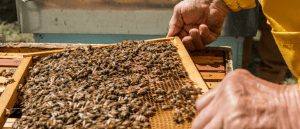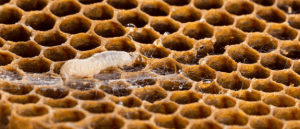
BioTechniques News
Beatrice Bowlby

Scientists discover lab-reared honeybee lifespans have decreased by half since the 1970s.
A myriad of environmental factors, including habitat loss and pesticides, are contributing to global bee population declines; however, entomologists at The University of Maryland (MD, USA) have found evidence suggesting a potential new cause – genetics. The recently published study reported that lab-reared honeybees’ lifespans are 50% shorter than they were in the 1970s. Modeling showed that the effects of this decline in longevity coincided with the decrease in honey production and increase in colony loss reported in the last few decades by US beekeepers.
In beekeeping, colony turnover is a normal occurrence as bees naturally age and die; however, over the last 10 years, beekeepers in the USA have reported higher than usual loss and turnover rates. In a bid to understand more about what is causing this phenomenon, scientists have focused their research efforts on investigating environmental stressors, diseases, parasites, pesticide exposure and nutrition; however, Anthony Nearman and Dennis vanEngelsdorp may have stumbled upon a new explanation.
 It’s time to fight back: honeybees vs. Varroa mites
It’s time to fight back: honeybees vs. Varroa mites
A new breed of honeybees, named “Pol-line”, has been selectively bred to identify and remove the Varroa mite from their colonies, which has been a major threat to honeybees for half a century.
The pair were conducting a study on standardizing caged bee rearing protocols when they first noticed the shortened lifespan. They were supplementing sugar water for plain water in the bees’ diet to try and mimic natural conditions when Nearman noted that, no matter the diet, the bees’ median lifespan was half that which was reported in comparable experiments from the 1970s. Upon making this discovery they began an extensive review of studies published over the last five decades.
“When I plotted the lifespans over time, I realized, wow, there’s actually this huge time effect going on,” Anthony Nearman, the lead author on the study, explained. “Standardized protocols for rearing honeybees in the lab weren’t really formalized until the 2000s, so you would think that lifespans would be longer or unchanged, because we’re getting better at this, right? Instead, we saw a doubling of mortality rate.”
To lab rear bees, researchers collect pupae from hives within 24 hours of them emerging from the wax walls they’re reared in. The pupae finish growing in an incubator and are transferred to cages when they’re adults.
Aren’t the conditions in a lab very different from those in a colony you might ask? Yes, and whilst this is true, historical data shows that bees reared in labs have a similar lifespan to those in colonies. It’s also generally assumed that factors that reduce lifespan in one environment will also reduce it in another. Additionally, this is the first study to connect colony turnover rates to previous findings, which showed that in the real world, honeybees with shorter lifespans spent less time foraging and had lower honey production.
 Reduce, reuse, bio-recycle: wax worm saliva capable of plastic degradation
Reduce, reuse, bio-recycle: wax worm saliva capable of plastic degradation
Enzymes discovered in wax worm saliva show potential for large-scale plastic biodegradation.
Through modeling, Nearman and vanEngelsdorp demonstrated that the resulting loss rates for a beekeeping operation experiencing a 50% reduction in honeybee lifespan would be 33%. This is similar to the average overwinter and annual loss rates (30% and 40%) reported by beekeepers in the last 14 years, suggesting that a reduction in average lifespan could be contributing to high turnover rates.
As the bees are collected as pupae, the cause must be occurring before that point, inside the colony. The team postulated that when the bees are at their larval stage and being fed by worker bees, they’re being exposed to a low-level viral contaminant or pesticide, though no signs of these exposures have been seen. Based on findings from other insects, it appears more likely to be a genetic component affecting longevity.
“We’re isolating bees from the colony life just before they emerge as adults, so whatever is reducing their lifespan is happening before that point,” Nearman reasoned. “This introduces the idea of a genetic component. If this hypothesis is right, it also points to a possible solution. If we can isolate some genetic factors, then maybe we can breed for longer-lived honeybees.”
The plan going forward will be compare trends in honeybee lifespan across the USA and other countries to see if there are differences in longevity. If there are, researchers can compare potential contributing factors, like genetics, between local bee stocks to help determine the cause.
The post Honeybee lifespans shorter than they used to bee appeared first on BioTechniques.
Full BioTechniques Article here
Powered by WPeMatico
